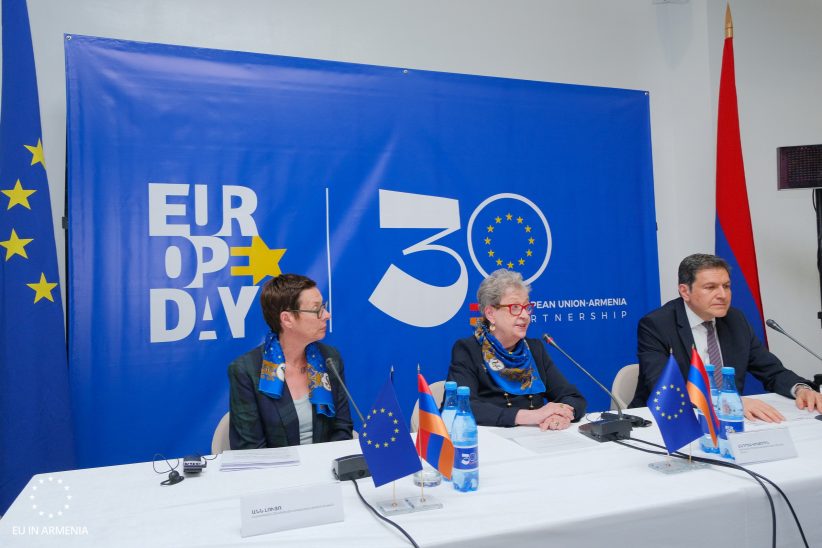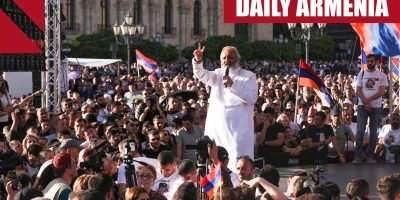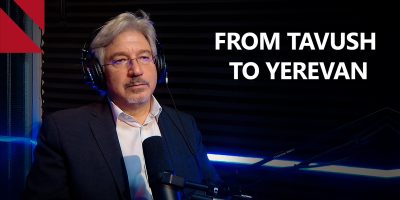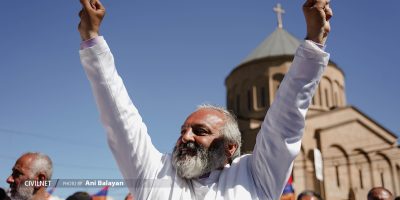By Mark Dovich
Andrea Wiktorin, the head of the European Union Delegation to Armenia, Anne Louyot, the French ambassador to Armenia, and Paruyr Hovhannisyan, Armenia’s Deputy Foreign Minister, met in Yerevan on Tuesday to mark Europe Day, which was Monday, as well as the upcoming 30th anniversary of EU-Armenia relations.
“Today the commemoration takes on a very particular meaning, because since the 24th of February, Europe as a whole has seen the return of war on a large scale in Ukraine,” Wiktorin told reporters at the press conference.
“On Europe Day, we remember what we do: defend and promote peace, democracy, human rights, and rules-based global order,” she continued. “In this spirit, we have very close and good relations with Armenia. We stand together, we support reforms and democracy in the country for the well-being of the Armenian citizens.”
“Peace is the heart and the identity of Europe,” Louyot added. “We strongly support all the efforts of the Armenian government towards peace and stability in the region.”
In turn, Hovhannisyan said he was “optimistic that our relationship will continue to grow and expand,” noting that the EU “remains our main partner in support of our transformation agenda,” as well as one of Armenia’s primary trade partners and the country’s main international donor.
“We remain committed to the implementation of the ambitious reform program,” he said. “The current agenda is truly impressive.”
In particular, the three officials highlighted joint priorities in judicial reform, education, and foreign investment, particularly for Armenia’s southernmost Syunik region, as well EU support for ongoing peace efforts between Armenia and Azerbaijan.
Wiktorin spoke at length about the 2.6 billion euro loan and loan guarantee package Brussels offered Yerevan last year, calling it “a common endeavor to get investment into Armenia,” with infrastructure, including the long-stalled North-South highway, being “one of the urgent requests.”
The package “is a combination of grants from the EU, over five years, to which are added financial instruments, which are loans, guarantees, and lending,” she explained, adding that the EU also “hopes that we get more private investment into the projects.”
One of the package’s main focuses is to encourage development in Syunik, which Wiktorin called “politically very important.” In particular, she highlighted EU efforts to secure funding for highway construction in Syunik, promote educational opportunities there, and provide support for local small and medium-sized businesses.
Read more: Explaining the €2.6 billion EU package for Armenia
Another EU priority in Armenia is to support ongoing peace efforts in and around Karabakh, according to Wiktorin and Louyot, who both emphasized that the EU’s role is that of a mediator.
“What we offer is facilitation,” Wiktorin said. “Mediation doesn’t mean that you come with a solution. Mediation means that you are creating a framework so that the conflict parties can find a solution…Our intention is to help find a sustainable solution that makes it possible for everybody to live in peace.”
Louyot echoed her comments, saying it was “important to remind” those in the region that the EU is “not negotiating directly,” but rather working to bring together the parties to the negotiating table.
Wiktorin also touched on the ongoing anti-government protests and acts of civil disobedience in Yerevan, which are now entering their second week, noting that the EU is “observing the situation,” but also underlining that “diplomatic representatives are not interfering in the internal affairs” of Armenia.
“The police must also follow all regulations, and there is no impunity for police or law enforcement agencies. This needs to be observed,” she added.
Read more: Yerevan protests stretch into second week as Armenia marks Victory Day
















